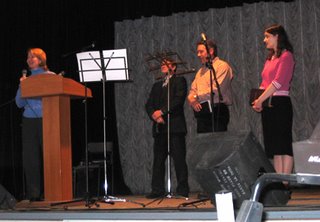military school so you’d never know there was church meeting inside. (In fact they’re not allowed to advertise the address on flyers).
The service was nice. First song was “Celebrate,” which we used to sing at Cornerstone all the time. The worship team consisted of two young women singing, a guitar player and a keyboard which had some drums programmed to match the songs.

Kevin did a nice job preaching on leadershp and it seemed well-received. Julia, the worship leader, and his translator did a great job. Turns out her parents run “The School of Tomorrow” which is a Christian school program that teaches bilingually. The use of English is a big draw for Russian parents so many non-christian, even muslim parents send their kids there. Julia told us the story of how her parents spoke only English in her home until she was 5 and she was very disappointed to learn that her father was not American. We met them, Len and Olga, after the service and I’ll want to stay in touch with them since they have opportunities for people to come and teach for a month or two.
Vladimir’s wife, Elena, also works at that school and thankfully she spent the rest of the day with us. We had spend the whole trip to this point watching the Russians but not having any opportunity to talk with them because so few spoke much English. Elena came to Moscow at 17 and married Vladimir 5 years later. They both got saved as a result of the big influx of foreign missionaries that came in 1991. As she told us, “The smiles and hugs arrived with the American missionaries.” The Russian people had been imprisoned spiritually up to that time and there was an outpouring of interest in spiritual things. Unfortunately there was a lot of “hit-and-run” missionary activity with little raising up of local leadership. After a few years, when the American missionary was ready to leave, Vladimir and Elena were handed the leadership role of their 1000 person congregation. They were both engineers under the soviet system and were overwhelmed by the experience. We still got the impression that they were lonely for fellowship from others who could relate to the struggles of leadership. It is very difficult to be a leader here because the people have been so abused by poor leadership and are averse to any hint of “control”.


We went back to the hotel and got there just as Jesse and Steve arrived, which was great. We then headed to the Pushkin museum and spent an hour there. Small collection but they had some nich Matisse and some Van Gogh’s which were a pleasant surprise. Then we wen to the the Cathedral fo Christ the Redeemer. A beautiful cathedral which was built in the mid-1800’s to celebrate the defeat of Napolean, torn down by Stalin in 1931 and replace with a swimming pool and then rebuilt for $200 MM in 1991 using “new Russian” (read mafia) money. This was the start of the Russian equivalent of Lent and they were in the midst of a service when we arrived. To our surprise the homily was being presented by Alexy, the Patriarch of the Russian Orthodox church (equivalent to the Pope). Elena said it must have been a secret he would be there or the church would have been so packed we never would have been able to get in. Quite a treat.

We then had a wonderful dinner at Moo-Moo, one of a small chain of restaurants serving Russian food cafeteria style. We had a great time talking with Elena about her experience growing up under the Soviet system (she’s 42) and the changes that came about in the 1990’s and continue to this day. They really seem to be struggling with the rapid changes going on. The rich get richer and the poor get poorer. The elderly in particular are having a hard time. Under the Soviet system they were esteemed. They paid their dues and were seen as the stabilizing force in society, caring for children while women worked (by necessity). Now, they survive on $70/month and the youth could care less about them. All the young are working hard to “make it to the top,” working three jobs to have the latest things. They pay relatively big $ to buy fashionable things. They may only have one or two sets of clothes which they wash each day, and they may fast for a week to save enough to buy the nice clothes.
1 comment:
Bob, this is awesome! Thanks for doing this - I'll link to it from my blog, as I just haven't had time to do something nearly this thorough. Well doing :)
Post a Comment